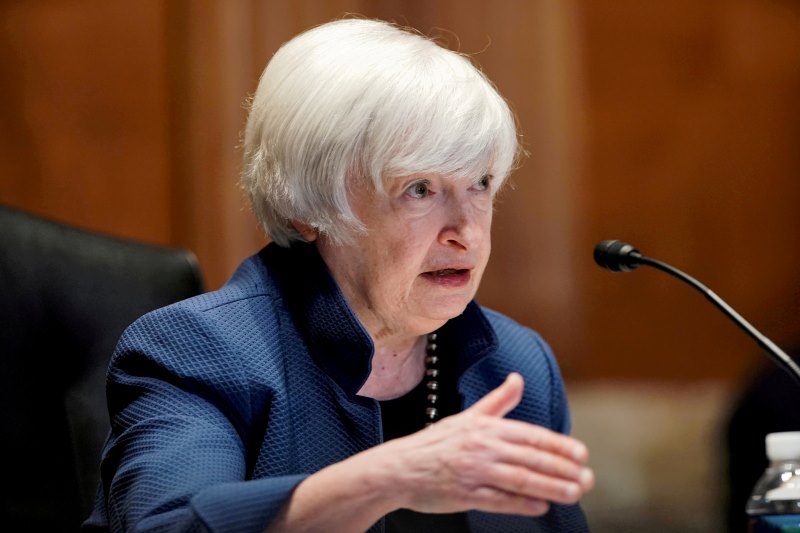Economy
U.S. Urges Europe to Strengthen Defenses Against Chinese Exports
Last week, the U.S. ramped up tariffs on approximately $18 billion worth of Chinese goods. The move aims to protect American industries from the influx of low-cost Chinese products. During a speech in Frankfurt on Tuesday, Treasury Secretary Janet Yellen suggested that Europe should follow suit and increase tariffs on Chinese exports.
“China’s industrial policy may seem distant as we sit here, but if we do not respond strategically and cohesively, the viability of businesses in both our nations and globally could be jeopardized,” Yellen warned. She is expected to further discuss this strategy in Italy, where she will meet with finance ministers from the Group of Seven (G7) advanced democracies.
European Skepticism Over U.S. Tactics
Despite the U.S. push, European officials remain divided on adopting similar measures. Many are skeptical of whether higher tariffs align with global trade rules and prefer maintaining good relations with China, a significant trading partner. European Commission President Ursula von der Leyen acknowledged shared concerns with the U.S. over China’s economic practices, particularly regarding overcapacity. However, she emphasized a “different, more tailored approach” rather than broad tariffs.
EU cautious on tariffs, prioritizing China relations and advocating tailored strategies over broad measures, Barron’s Subscription said.
China’s Global Economic Role
At the heart of the trans-Atlantic tensions is China’s role in the global economy. Chinese officials have been actively engaging European leaders, with President Xi Jinping visiting three European nations this month to strengthen economic ties. Meanwhile, Washington views European support as crucial for isolating Beijing globally and validating American grievances about Chinese commercial practices.
EU Investigates Chinese EV Imports
Last year, the EU initiated an anti-subsidy probe into Chinese EVs worth $11.5 billion in 2023 imports. Until early next month, affected firms may receive notices of potential provisional tariffs. A November deadline looms for more permanent measures. Von der Leyen hinted at EU tariffs, likely less severe than the recent 100% U.S. duty on Chinese EVs.
Broader EU Strategies Against Chinese Economic Policies
The EU’s investigation into EVs is part of a broader strategy to leverage its legal mechanisms against China’s economic policies. In recent months, the EU has initiated several probes into Chinese subsidies and their impact on EU public procurement markets. The EU is also examining whether China’s domestic procurement practices unfairly benefit Chinese medical-device companies.
“The EU will continue to pursue a combination of actions to address unfair trading practices,” a European Commission spokesperson stated.
Divergent Views Among EU Member States
EU member states remain divided over their response to China’s economic policies. Export-driven Germany has expressed reservations about raising tariffs on Chinese EVs, given China’s importance as a market for German manufacturers. Western brands, including Tesla and BMW, produce EVs in China for export to Europe.
Yellen clarified that she wasn’t necessarily advocating for identical policies between the U.S. and Europe. “Each country has different tools and concerns and will use them as appropriate,” she told reporters.
Challenges in Forming a Unified Front
The U.S. has faced difficulties in forming a unified approach with Europe on several fronts aimed at countering China’s economic power. Efforts to reach a trade agreement on critical minerals for clean-energy technology, a sector dominated by Chinese firms, have stalled. Additionally, while the U.S. has intensified efforts to restrict Chinese access to advanced technology and investment, Europe has largely refrained from matching these measures. Yellen mentioned in an interview that the U.S. might continue to escalate actions against China if necessary.
Potential Chinese Retaliation
These escalating measures heighten the risk of Chinese retaliation against both the U.S. and EU. The China Chamber of Commerce to the EU cautioned that Beijing might increase tariffs on certain car imports, referencing Chinese media reports and insider information.
Recently, China launched an antidumping investigation into polyoxymethylene copolymer, a plastic used in auto parts and electronics, affecting imports from the U.S., EU, Japan, and Taiwan. The European Commission stated it would review the Chinese investigation’s findings before deciding on subsequent actions.
Discover today’s market trends with Bloomberg’s digital subscription at an amazing 70% off. Stay ahead with insights into commodity indexes and exchange-traded funds. Experience exclusive ETF trading, a U.S. privilege, on Bloomberg’s advanced platform. Don’t miss out, access comprehensive market news now!

